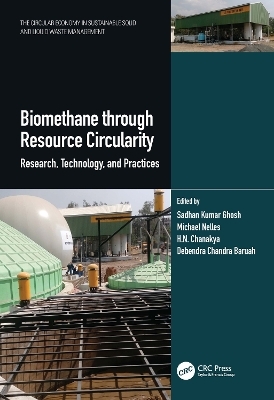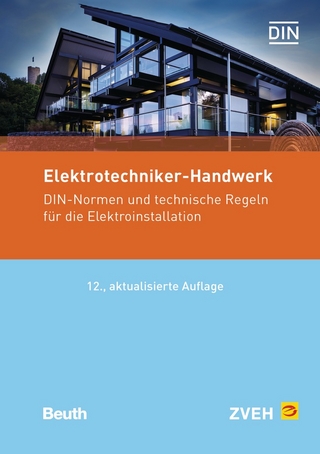
Biomethane through Resource Circularity
CRC Press (Verlag)
978-1-032-06900-5 (ISBN)
Biomethane through resource circularity: Research, Technology and Practices is an invaluable resource for researchers, policy makers, implementers and PhD and Marsters level students in universities analyzing the present status, waste biomass including agro wastes, success in experimentation & commercial production, future needs and other relevant areas. While huge biomass is wasted by open burning, there is potential of energy generation that can be extracted from the biomass preventing GHG emission and creating business opportunities. Abundance and renewable bioenergy can contribute to a more secure, sustainable, and economically sound future through biomethanation process by selecting followings:
Supply chain sustainability of clean energy sources
Appropriate Anaerobic Digestion technology with different feedstock
Processes Parameter Optimization and best fit conditions,
Productivity, Purification of biogas and end use
Economic feasibility as business case, Commercialization, generating employment and Revitalizing rural economies
This book addresses most of the above issues in lucid manner by experts in the field from different countries which are helpful for the related stakeholders edited by experts in the field.
Dr. Sadhan Kumar Ghosh, Professor in Mechanical Engineering since 1998 & Chief Coordinator, Centre for Sustainable Development and Resource Efficiency Management at Jadavpur University, India. He also served as the Dean, Faculty of Engineering and Technology & Head, mechanical engineering. He was the Director, CBWE, Ministry of Labour and Employment, Govt. of India and Larsen & Toubro Ltd. He is a renowned personality in the field on Waste Management, Circular Economy, Green Manufacturing, Supply Chain Management, Sustainable Development, Co-processing of Hazardous & MSW in cement kiln, Plastics Waste & E-waste management & recycling, management system standards (ISO) and TQM having three patents approved. Prof Ghosh is the founder Chairman of the IconSWM; President, International Society of Waste Management, Air and Water (ISWMAW) and the chairman, Consortium of Researchers in International Collaboration (CRIC). He received several awards in India and abroad including the distinguished visiting fellowship by the Royal Academy of Engineering, UK to work on ‘Energy Recovery from MSW’. He wrote 9 books, 40 edited volumes, more than 230 national and international articles & book chapters. He is the Associate Editor of Waste Management, Journal, Elsevier and International Journal of Materials Cycle and Waste Management (IJMCWM) and Editor-in-Chief of IconSWM-ISWMAW Secretariat. His significant contribution has been able to place the name of Jadavpur University in the world map of research on waste management. He is consultant & international expert of UNCRD)/DESA, Asian Productivity Organization (APO), Japan, China Productivity Council (CPC), SACEP Sri Lanka, IGES Japan etc. His international research funding includes, European Union Horizon 2020, Erasmus plus, UKIERI, Royal Society–DST, GCRF UK, Royal Academy of Engineering, Georgia Govt. etc. He is the leader of the Collaborative International Research Project on "Global Status of Implementation of Circular Economy (2018-2022)" by ISWMAW involving experts from 44 countries. He was the convener of ISO TC 61 WG2, member in the Indian mirror committee of ISO TC 207 & ISO TC 275. He is expert committee member of government initiatives & was the State Level Advisory Committee Member of Plastics Waste (Management & Handling) Rules 2011, expert committee member for the Preparation of standards for RDF for utilisation set up by the Ministry of Housing and Urban Affairs (MoHUA), govt of India, Chair Elect of 11th IconSWM 2021 to be held in Dec 2021. He is available at: sadhankghosh9@gmail.com & www.sadhankghosh.com. Dr. Michael M. Nelles, Full Professor of Waste and Resource Management of the Faculty of Agricultural and Environmental Sciences of the University of Rostock, Germany since 2006. Since 2012 Prof. Nelles is also the Scientific Director of the German Biomass Research Center (DBFZ) in Leipzig.is an environmental engineer and studied Technical Environmental Protection (Technical University of Berlin). From 1994 to 1999 he was the Vice Director of the Department Waste Management of the Montanuniversität Leoben in Austria. From 2000 to 2006 he was Professor of Environmental Engineering of the University of Applied Science in Göttingen (Germany). His research activity is based on: fundamental and applied aspects of waste management with focus on technological, environmental and economic aspects to mechanical, biological and thermal treatment systems of waste and biomass in different recycling and recovery routes. He is a member of national and international Advisory Boards of organisations in the field of waste management and biomass utilisation and also a Board-Member of different national and international conferences and journals. He is author of over 400 articles and chapters in books and journals since 1994. His international activities focus on the Asian Region and in particular on China (Guest Professor in Beijing, Hefei, Shanghai & Shenyang; National Friendship Award 2011). Dr. H. N. Chanakya, Chief Scientist , Centre for Sustainable Technologies, Indian Institute of Science, Bangalore, India having over 50 publications and expert in the area of biological waste management. He extensively worked on high rate biomethanation of liquid and solid wastes and developed several high rate biomethanation technologies for the treatment of organic solid wastes, leaf litter, agro-residues, agro-processing effluents, etc. In addition, has evolved processes for reuse of sewage to restore water bodies and recycling of domestic grey-water. Towards making biomethanation processes a lot more sustainable, he has developed several value added by-products such as fiber, pest repellants, stored-grain disinfectant, mushroom, lignin removal strategies, etc. from biomethanation residue and digester liquid. He has served as Technical Advisor to various regulatory and implementing bodies in Karnataka such as KSPCB, Bangalore City Corporation (BBMP), Bangalore Water Supply and Sewerage Board (BWSSB), etc. as well as at the National level to DST, DBT, MNRE, etc. He is the nominated member of Karnataka State Planning Commission. Dr. Debendra Chandra Baruah, Professor in Energy dept. at Tezpur University. He has contributed significantly to the fields of farm mechanization, energy conservation, rural energy planning and management, biomass residue utilization, waste management and clean energy generation and published more than 100 articles, guided 20 PhD Scholars. Fourteen National and International collaborative projects, have been successfully handled by him. Development of spatial energy model for crop harvesting, generation of useful knowhow related to energy management in agriculture, energy demand forecasting for mechanized rice farming, modeling of tea drying behavior and development of low cost solar air heater, development of spatial model for assessment of biomass/bio-waste using GIS-remote sensing targeting to achieve rural circular economy, development of multi-purpose biomass cookstove with provision of waste heat recovery and identification of non-edible biodiesel feedstock have been some notable research outputs of Prof Baruah. He visited USA, UK, Bangladesh, Thailand, South Africa, Singapore, Belgium, Greece on academic and research purposes. Prof Baruah has served as HoD, Dean of Students Welfare, Director of Internal QA Cell and Coordinator of IPR Cell at Tezpur University.
Section I: Biomethane: Energy, Society & Circularity Nexus. 1.Changing Focus on Bioenergy through resource circulation: A review for India and Europe. 2.Kinetic modeling of biogas production from organic fractions of Municipal solid waste and projection of energy and energy potentials. 3.Biomass supply chain for anaerobic methane generation: issues and concern. 4.Bioenergy in Germany- Status and Outlook. 5.Feasibility Study of Commercialized Self Circulating Biogas Generators: A Circular Economy Approach. Section II: Biomethane: Research, Development. 6.Improvement in biogas production by direct interspecies electron transfer technique: Current aspects and diverse prospects. 7.Biogas recovery from poultry and piggery waste: a review. 8.Mini Review: SSBR Design for Leaf Litter Digestion. 9.Anaerobic Co-Digestion of Drain Sludge with Fermentescible Municipal Waste of Sokode (Togo). 10.Effect of inoculum concentration and particle size of the substrate on anaerobic digestion of yard waste. 11.Mathematical Modelling of Aerobic Digestion in Activated Sludge Process. 12.Anaerobic co-digestion of landfill leachate and sewage sludge: Role of substrate ratio. Section III: Biomethane: Feedstock, Production, and application. 13.Economic aspects of Waste Valorization with the aid of Anaerobic Digestion and other technologies. 14.Biomass from Agricultural Wastes for Renewable Energy in the Philippines. 15.Utilization of Food processing Waste for Energy Generation. 16.Anerobic digestion of ocimum sanctum (holy basil): effect of inoculum and substrate concentration. 17.Assessment of Biogas Generation Potential of Mixed Fruits Solid Waste. 18.Agricultural waste to biogas energy: Design and simulation using the Anaerobic Digestion Model No. 1. 19.A Review of Operating Parameters, Pre-Treatment Process and Digester Design Effect on Biogas Production in Anaerobic Digestion. 20.Biogas potential of kitchen waste at Visva-Bharati, Santiniketan. 21.A source of Bio-gas Generation and sustainable development in rural India. 22.A study of the Processes, Parameters and Optimization of Anaerobic Digestion for food waste. Index.
| Erscheinungsdatum | 22.12.2021 |
|---|---|
| Reihe/Serie | The Circular Economy in Sustainable Solid and Liquid Waste Management |
| Zusatzinfo | 38 Tables, black and white; 24 Line drawings, color; 43 Line drawings, black and white; 6 Halftones, color; 4 Halftones, black and white; 30 Illustrations, color; 47 Illustrations, black and white |
| Verlagsort | London |
| Sprache | englisch |
| Maße | 178 x 254 mm |
| Gewicht | 653 g |
| Themenwelt | Technik ► Elektrotechnik / Energietechnik |
| Technik ► Umwelttechnik / Biotechnologie | |
| ISBN-10 | 1-032-06900-7 / 1032069007 |
| ISBN-13 | 978-1-032-06900-5 / 9781032069005 |
| Zustand | Neuware |
| Haben Sie eine Frage zum Produkt? |
aus dem Bereich


